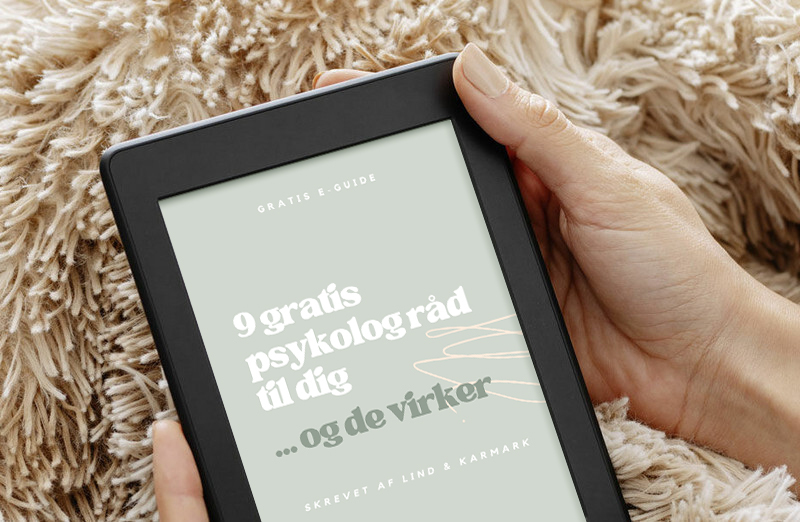Obsessive Compulsive Disorder
What is Obsessive Compulsive Disorder?
Obsessive Compulsive Disorder (OCD) is a type of anxiety disorder dominated by obsessive thoughts and compulsive actions. When you suffer from it, you experience thoughts or engage in actions that rationally don’t make sense. A person suffering from Obsessive Compulsive Disorder will be aware of this, but there is so much anxiety and doubt involved that one feels compelled to take it seriously. Therefore, it can feel wrong and even irresponsible to let these “danger signals” be.
Typical signs of Obsessive Compulsive Disorder are unwanted obsessions and compulsions, which one revisits over and over again with the hope of removing discomfort and minimizing catastrophic outcomes.
When you suffer from Obsessive Compulsive Disorder you can experience different obsessive thoughts and compulsions which tends to change theme over time. It’s also normal that the same obsessional thought repeats itself for years.
Obsessive Compulsive Disorder can vary in its level of severity, but generally speaking OCD can be really painful to deal with. Often there’s also a lot of shame involved as the obsessions and compulsions can come across as rather strange. Unfortunately, that also means that many people are reluctant to seek help and struggle with it on their own for a long period of time prior to seeking treatment. Have you also been struggling with Obsessive Compulsive Disorder for a long time?
Who gets Obsessive Compulsive Disorder?
Obsessive Compulsive Disorder often emerges during childhood or adolescence. Several factors can play a role in the emergence of it. Heredity can also play a role. Perhaps you have family members who suffer from Obsessive Compulsive Disorder?
One neurobiological explanation of Obsessive Compulsive Disorder postulates that some people experience a chemical imbalance in their brains which makes them more prone to misinterpret anxiety signals. You cannot fully explain why some people are more exposed to this chemical imbalance than others. Our experience (with many years of OCD treatment) is that it’s often chemical substances that are playing a trick – and maladaptive strategies that exacerbate the signals of danger.
There can also be psychological explanations as to why you have developed Obsessive Compulsive Disorder. It can be due to a difficult upbringing or challenging life circumstances with loss and trauma which has prompted the anxiety. The underlying cause of Obsessive Compulsive Disorder differs from person to person. It is typically a combination of different factors and circumstances.
Do I have Obsessive Compulsive Disorder?
Do you recognize yourself in the abovementioned description? Then you might be struggling with this type of anxiety. Although it’s not nice to know, it’s the first step towards getting better.
When you know that you’re struggling with Obsessive Compulsive Disorder you can look for specialized and effective treatment. And don’t worry! It’s possible to find proper and effective help. We are specialized OCD treatment and are passionate about making a difference.
What type of Obsessive Compulsive Disorder do I have?
You typically distinguish between two types of Obsessive Compulsive Disorder; a predominantly obsessional one and a predominantly compulsive one.
With both types of Obsessive Compulsive Disorder, obsessional thoughts and compulsions are involved. However, with obsessional OCD, the obsessional thoughts take up most space whereas the compulsions are at the core in the compulsive type of OCD.
Predominantly compulsive form
The urge to engage in compulsive rituals is very strong when you suffer from predominantly compulsive OCD.
Typical variations of compulsive OCD are:
- Checking rituals
- Excessive hygiene rituals
- Rituals that must be used until it “feels right”
The themes of compulsive OCD are often centered around a fear of accidents, fear of contaminating others, or fear of being responsible for someone else being in an accident.
Predominantly obsessional form (also known as “Pure O”)
With Pure O it’s primarily obsessional thoughts that take up space. Usually, the same themes pop up again and again.
Typical variations of obsessional themes are:
- Anxiety of sexual perversions
- Anxiety of violent themes
- Anxiety of incorrect feelings
- Anxiety of losing one’s mind
Typical (maladaptive) coping strategies for dealing with the anxiety associated with “Pure O” are:
- Analyzing the same thing over and over
- Monitoring one’s bodily symptoms
- Looking for evidence
- Asking for reassurance
Obsessive Compulsive Disorder treatment
Have you been struggling with OCD for a long time? Do you find it tearing on your life quality? Have you previously tried treatment for OCD which was unsuccessful? Do you wish to get specific and targeted OCD treatment?
Then we have both good news and bad news
Bad news first
OCD treatment is not a quick fix. It’s often one of the most persistent anxiety disorders to treat. Usually, people have been struggling with OCD for a long time prior to seeking treatment which also means that the OCD can be rather severe.
Good news
However, we can help you with your OCD and it’s possible to feel much better! We are skilled, experienced, and leading psychologist when it comes to OCD treatment in Copenhagen. Let’s help you break free from your OCD.
We offer both physical therapy sessions in our clinic in Copenhagen as well as online therapy sessions. We have a lot of experience with conducting online therapy sessions and have thus been able to help many individuals around the globe.
Please don’t hesitate to contact us by phone: +45 53 88 12 00 or e-mail: kontakt@kognitivpsykologpraksis.dk if you have any questions prior to booking an appointment. We are always more than happy to help you further and answer any questions you might have.
Flere terapi tilbud
Hos Lind & Karmark tilbyder vi terapi både individuelt, i gruppe eller online. Klik på boksene til højre, hvis du vil læse mere.
Er du forældre på udkig efter kvalificeret psykologhjælp til dit barn, så klik på boksen med "Terapi til Børn".
Vi ser frem til at hjælpe!
